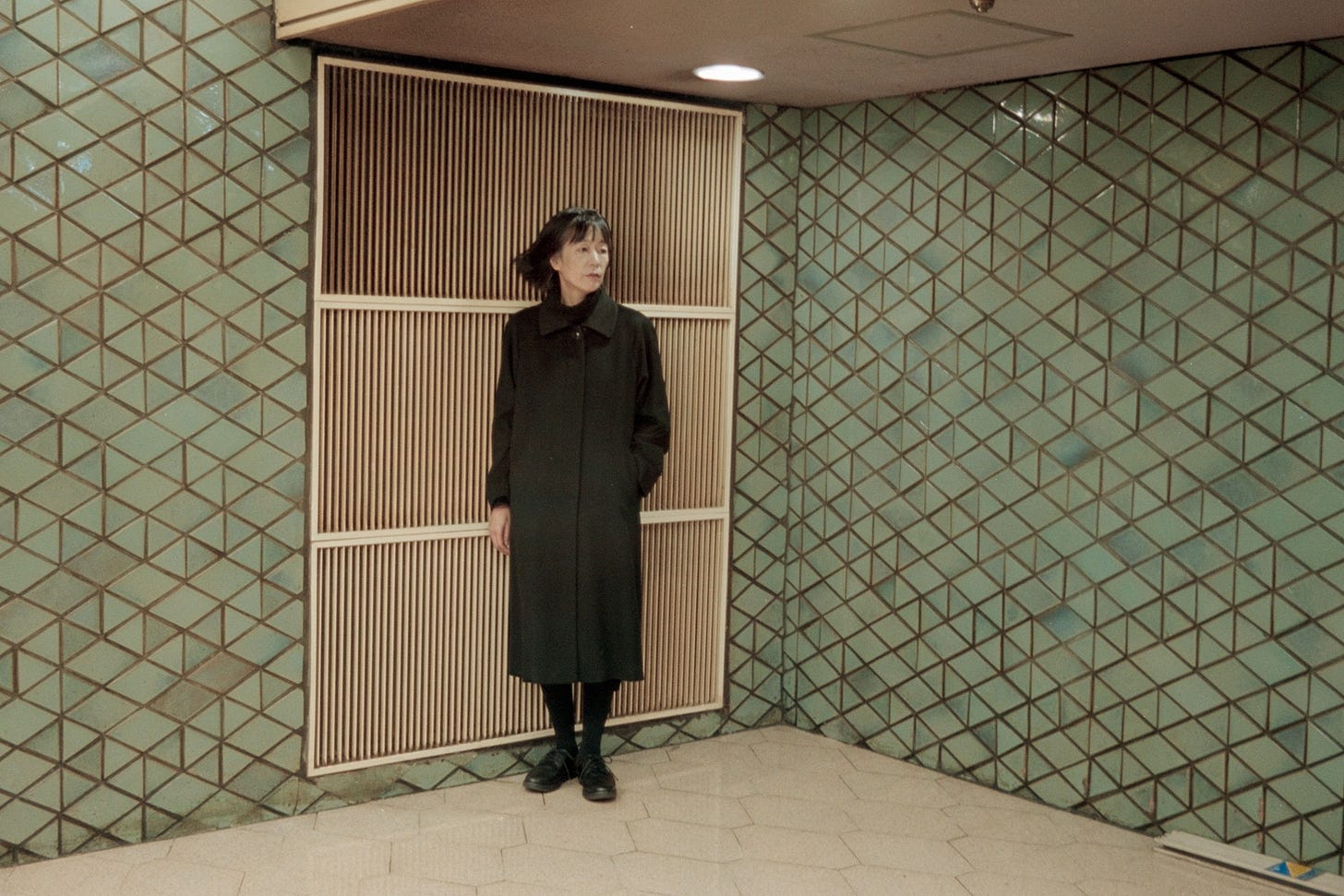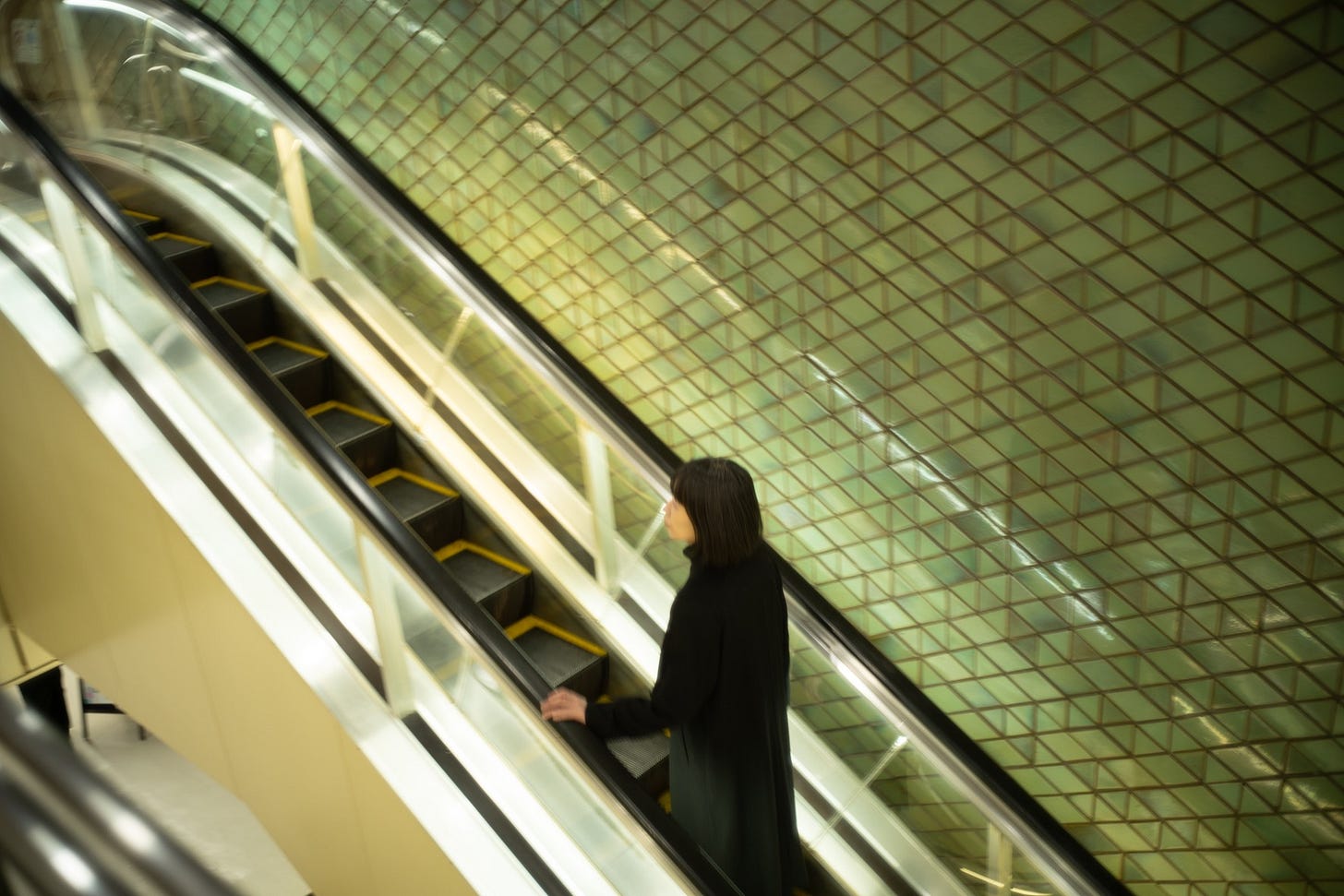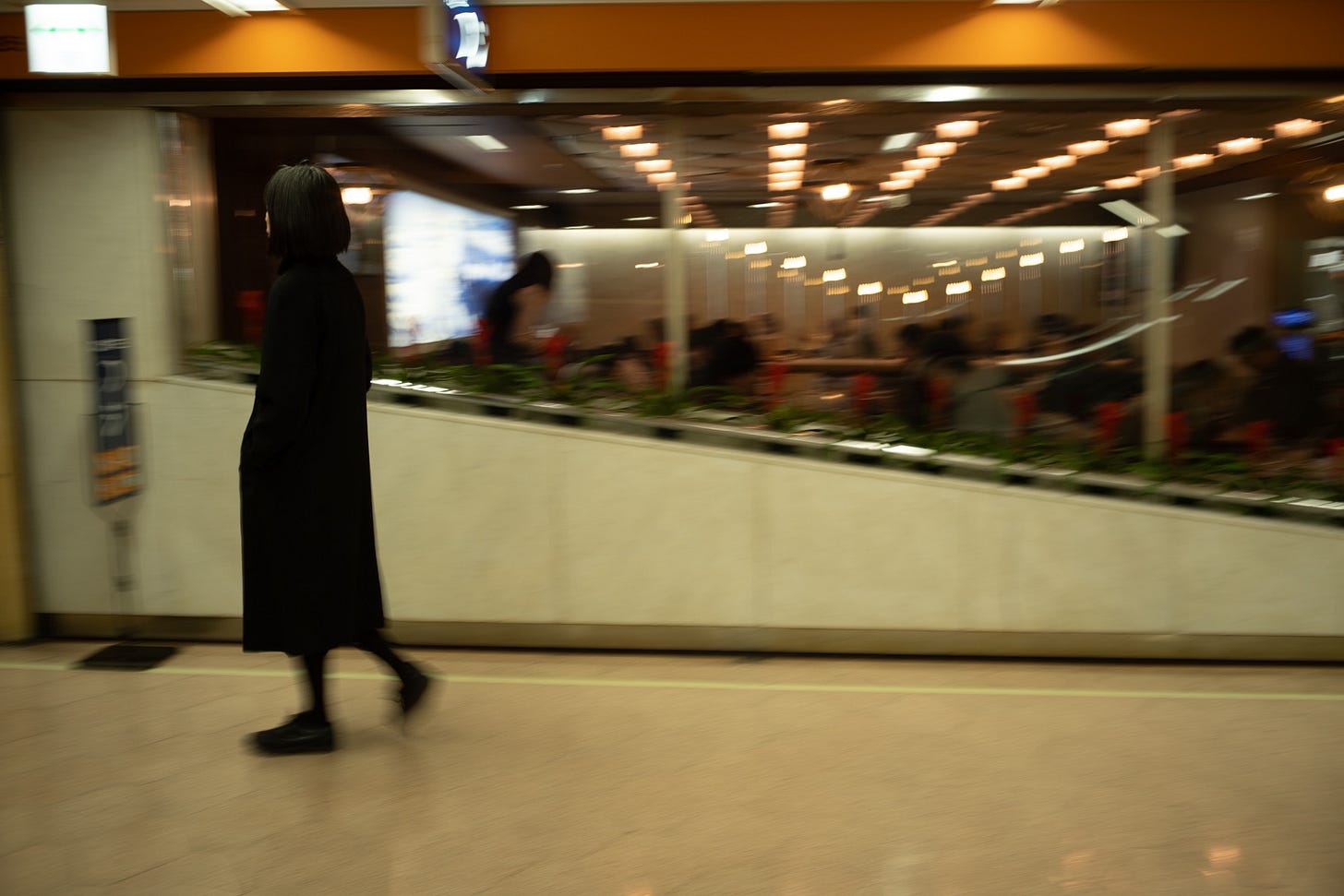Tone Glow 029.6: Phew
An interview with Phew for a special midweek issue, presented in both English and Japanese // 今週の特別号・第四弾はPhewとの対談インタビュー (日本語訳あり)
Phew
Japanese experimental artist Phew has been working in underground music since forming the short-lived punk band Aunt Sally in the late ’70s. After being involved in many collaborations from the ’90s onward, the last five years have seen the artist making music under her solo name. Ryo Miyauchi talked with Phew via Skype on August 13th, 2020 to discuss her creative process, her recent activities and her new album. The interview was conducted in Japanese and translated to English by Miyauchi.

Photo by Masayuki Shioda
Ryo Miyauchi: Hi, where are you calling from?
Phew: From Kawasaki.
What kind of place is it?
Kawasaki is about 15 minutes from Tokyo. It’s the suburbs. Where are you?
San Diego. Is Kawasaki where you also work on music?
Yes, my home is the studio… Well, more like a place where I can record.
You’re probably around people, but how is your recording process?
I have simple gear, like the computer and speakers, mixer, instruments, and a mic at home. It’s a set up where I can record whatever I think up right away.
Was your new album recorded the same way?
Yes. To be more accurate, for Vertigo KO, not all of the songs were recorded for the album. I sell CD-Rs that you can only buy at my shows, and some of the songs from the album is from my fifth one that I sold two years ago. And last year, I was asked by WFMU, the New Jersey radio station, to contribute to their compilation. The theme was to cover a song from a record released in 1979, and I chose a song by the Raincoats.
Four of the songs in Vertigo KO were from the CD-R and that compilation, and the other two are new songs I recorded for the album. I recorded those at my home.
So the times when you recorded them are all mixed.
Yes. They’re from between 2017 to 2019.
Listening to the songs on Vertigo KO, they seemed like songs that don’t exactly fit into Light Sleep or Voice Hardcore.
Light Sleep was the first album I made when I started making electronic music, so I think it’s an album that you can feel excitement and inspiration. Voice Hardcore was an album where I decided first to make an album using just my voice. There’s a balance between the voice and electronic music and more thinking behind it in Vertigo KO, so I think it seems more objective.
Is the material that’s in your CD-Rs kind of like demos?
Yes. With CD-Rs, you can record things as you think them up, and then release it right away. There’s not a gap of time in between the time you record and release the songs. I thought that was fun, so I started doing that around… I think 2015.
It’s like how people upload things on SoundCloud these days.
Yes, though I’m putting it out for people who came out to my shows, so there’s more part in the physical.
Did you update the material for the album?
For this one, I just shortened the time for the album. I didn’t do anything else.
Are there times when you add things?
No, only about changing the song length.
Was there any particular reason you wanted to add these songs to Vertigo KO?
For this album, it was a joint effort with the label Disciples that’s putting out my album.
What year was it? In December 2018, I played a show in London. That was around the time I put out an album called Islands with Ana da Silva of the Raincoats, and I played a show in London for the album release. That was when I first met the people at Disciples, who said they were listening to my music for a long time, and that’s when they first talked about how they wanted to work with me.
I went to London again in May 2019 to talk with Disciples because I wanted to release an album with new music. When we talked more in detail, their thing was to compile unreleased material, which I couldn’t be really interested in. You know how there’s a whole world among collectors where unreleased material, especially music from the ‘80s, gets priced at high values once it’s out? I didn’t really like that, so I didn’t have much interest in putting out unreleased material.
And then I got a new release by His Name is Alive from Disciples. I checked it out, and it felt like a product of love from the album sleeve to how they made the record. I felt that this was more than just putting out unreleased material and the label genuinely cared.
When I got home to Japan, I sent them my unreleased music. The label picked out some songs, and they chose songs I wouldn’t pick out on my own. From there, we communicated back and forth to work together on the album from the song order to the title.
You also contributed a release for Cafe OTO’s Takuroku. About the release, you said, “recording makes the future, in other words, my present might be reflected in what was recorded in the past,” but was there anything you felt listening back to your old recordings?
I don’t listen back to things I did in the past, but it was a fresh feeling when I listened back for Cafe OTO. It was a new kind of process. Like, viewing the past in a new perspective, you can say? The theme from Cafe OTO was “the sound of quarantine.” Although I was recording music at the time, I felt that I shouldn’t put out what I’ve been making right away. A lot of big things happened, and times are like this now. Understanding these things takes a lot of time, so I didn’t want to rush and release. Capturing big events like, for example, tragic events of the past is a long process. So in the conversation of this pandemic, I didn’t want to put out what I’ve been working on yet, and so that’s why I looked for my recordings in the past.
So it’s a little different from your CD-Rs, going from wanting to immediately release it to not putting your music out right away.
Right, yes. When you get a theme like the pandemic, I end up stumbling a bit.
Do you work easier without a topic or theme?
It’s much easier. Even now, I’m recording without a set theme, and it’s easier. There are times when it is easier with a theme, but it depends on the theme. Like, the pandemic or the nuclear power accident, issues that you should think about in depth. These are problems concerning all of humanity, and I think they are problems you shouldn’t react so impulsively.
Whenever I listen to the music, I get a sense that you create freely, but are there any rules or anything you watch out for?
There was a time when I would make up a lot of rules, but over time, they would make me feel like, why am I doing something so dumb? There’s the first song on Vertigo KO, the pretty, ambient-ish one. For that song, I decided to only use sounds from free software. After that, I thought, why did I do this?
At the time, there was a trend to use modular synths and reveal more of what went on in the production process. I didn’t like that and thought it was silly—might as well not use any money, and create using something that’s free. That was the thinking behind it. But maybe I was just jealous (laughs). Maybe I was just trying to go against me actually wanting tons of new gear. The fact that I cared about it seemed really dumb, so I stopped with that rule.
There are a lot of songs with your voice. Vertigo KO has you talking about the morning view and the rain. But do you have something in mind before you record or are you saying what comes to you as you’re recording? What’s the process?
I really just recorded what came to mind at the time. But these days, I only have things like the weather and the seasons in mind (laughs). There’s not much I can talk freely about besides the weather.
But that’s what I like about your music. There’s this feeling of it like a sketch or a personal diary.
Thank you. I think a big thing is that I record at home. I can record right as I think it up, so that’s why it turns out that way. I don’t really make it with something in mind.
I feel playfulness from your voice, but what do you think about when you use your voice?
My voice is something I can freely control more than any other instrument. Even if I can’t use the synth or another instrument well, I have my voice. I can express myself freely. It’s easy to use.
Are there still a lot of things you’ve recorded that you haven’t put out yet?
Yes, tons of trash.
Why is it trash to you?
Rather than getting that feeling of finishing something, I’d rather work on the next thing. It’s my personality.
You just don’t want to hear it again?
No. I’d rather just trash it, and work on something else. It’s just my personality.
In that pile, is there anything that turned out more silly than expected?
Maybe there is, but I’ve forgotten about them.
It seems like you make music primarily for yourself, so I thought you’d have a lot that you have yet to share.
I do have a lot, but it doesn’t really matter. But when I was cleaning my house, I found a lot of cassette tapes with old live recordings. When I listened to them, it felt like listening to a whole different person, and it was a fresh experience. I didn’t even remember doing that, so that was very exciting. Maybe I’ll release them. It’s like I discovered a completely new artist.
Are there new songs you haven’t put out yet?
I’m always recording. I’ve been wanting to put out a new album next year, so I’ve been saving them.
How do the new songs sound?
There’s a lot that was made during quarantine, so I think it has a nice airiness to them, maybe because I mentally pictured a place like that while recording.
What do you mean airy? Like it has a positive atmosphere?
It’s more open, or that’s how I hear it anyway.
Phew
Phewは、70年代後半に、パンクバンド、アーントサリーで活躍。そして1980年に、坂本龍一プロデュースシングルでソロ名義デビューしてから、アンダーグラウンドミュージックには欠かせないアーティスト。00年代の初めから、Phewとしての作品を出さない期間が長く続いたが、この数年、彼女はソロ活動の方に優先している。彼女は、自分の音楽の作り方、こだわり、そして新しいアルバムの話の事を、Skypeを通して語ってくれた。

撮影:塩田雅之
宮内 凌: 今は、どこからお電話されているんですか?
Phew: 川崎です。
どういう所なんですか?
川崎は、東京から15分ぐらい。郊外です。そちらはどこですか?
サンディエゴです。そこで作業とかされているんですか?
家がもうスタジオ... スタジオっていうか、まあ録音できるようになってます。
人の周りで録音されているようですが、どういう風に作業されているんですか?
簡単な録音機材、コンピューターとスピーカー、ミキサー、楽器、マイクが家にあって、思いついた事をすぐ録音出来るような環境です。
次に出されるアルバムもそういう風に録ったんですか?
そうですね。『Vertigo KO』は正確に言うと、全部がこのアルバムの為に録音された曲じゃないんですよ。私は、ライブ会場限定で、CD-Rを正規的に販売してて、それの5枚目を一昨年、販売し始めたんですね。その中の曲と、去年、WFMU、 ニュージャージーのラジオ局の依頼で、コンピュレーションに参加されたいって、依頼があって、でそのテーマが、1979年にリリースされたレコードの中から一曲選んでカバーして下さい、っていう事だったんです。それで、レインコーツのカバーをして、一曲提供しました。
4曲はそのCD-Rと、そのラジオ局に提供した一曲の音源で、その2曲は、アルバムの為に、新しく録音しました。でもそれは、自宅で録音した物です。
バラバラというか、録った時はみんな違うんですね。
そうですね。2017年から2019年の間になされた物です。
『Vertigo KO』を聴いてて、『Light Sleep』にあまり入らない、『Voice Hardcore』にもちょっと入らない、真ん中あたりの感じでした。
『Light Sleep』は、私が電子音楽を始めて、一番最初のアルバムなんですよ。だから、私が音楽を作るのが楽しくてしょうがないとか、より衝動的のが出てるアルバムだと思うんですよね。『Voice Hardcore』は、最初から声だけで作るっていう縛りがあったんですよ。『Vertigo KO』っていうのは、声と電子音のバランスっていうか、意識的に考えだした。だからより客観的というか、オブジェクティブ、そういう感じだと思います。
そのライブ限定のCD-Rは、デモ音源みたいな感じですか?
そうですね。CD-Rって、思いついた事を、すぐ録音して、すぐリリース出来るじゃないですか。その時間差がない。作った時から、リリースするまでの時間差がほとんどない。それが面白いって思って、2010… 何年かな?15年から始めました。
今で言うと、SoundCloudとかにアップする感じですよね。
そうですね。でも、ライブを見にきてくれた人だけに販売するって事だから、よりもっとフィジカルていうか。
それでまたアルバム用にアップデートしてもっといい作品にするんですか?
今回はちょっと時間を、アルバム用に短くしただけです。他は何もしてないです。
CD-Rの物にもっと何かを加える時もあるんですか?
ないです。曲の長さを変えるぐらいです。
この曲を『Vertigo KO』に入れたいっていう理由はただ好きっていうよりもっと深い物もあるんですか?
これはどちらかというと、ディサイプルズっていうレーベルからリリースされるんですけども、このアルバムはそのレーベルとの共同作業っていう感じですね。
何年だったかな?2018年の12月に、私、ロンドンで演奏したんですね。ちょうどレインコーツのアナ・ダ・シルヴァとのコラボレーションアルバム、『Islands』を2018年にリリースしたんですけれども、リリース記念ライブの為に、ロンドンで演奏したんですけど、そこにディサイプルズのレーベルの人が見に来てくれたんですよ。その時に、初めて、私の音楽をずっと聴いていてくれて、いつか一緒に仕事出来たらいいですね、みたいな事を言われたんですね。
その2019年の5月にまたロンドンに行って、私は新しい録音のアルバムを出したかったんですよ。それでまたレーベルの人に会って話して、もっと詳しい話を聞いたら、ディサイプルズは未発表音源を集めてリリースするのがコンセプトで。それで、私はちょっとあまり自分の未発表音源を出すっていう事に興味を持てなかったんですね。特に80年代の物なんて、いっぱい未発表音源が出て、それですぐ高値で取り引きされるみたいな世界があるでしょ?コレクターの間で。私はそういう世界が好きじゃなくて、未発表音源をリリースするって事に対して興味を持てなかったんですよ。
それでディサイプルズからヒズ・ネイム・イズ・アライブのリリースされたばかりのレコードを貰ったんですね。それを聴いてみて、これは本当に愛情がある製品だった。ジャケットとか、レコードの作り方。凄くこれは、未発表音源をリリースするだけじゃなくって、何かレーベルとして慕いたい事があるなって感じたんですね。
日本に帰ってから、未発表音源を送ったんです。それで何曲か、レーベルの方からセレクトしてきた曲、凄く意外な物。自分からはあんまり選ばないような物がセレクトされてきたんですね。それで面白いなぁと思ったんですよ。それで曲順とか、アルバムタイトルとか、ディサイプルズとやりとりしながら決めていきました。
Phewさんは、自粛期間中にカフェOTOというレーベルにも音楽を提供しました。そのリリースと共に「過去の物が未来に通じている」って書いてあったんですけど、前にやった物を聴き返して何か感じる物ってあるんですか?
私は、自分の昔の物を一切聴かないんですけども、今回、カフェOTOからそういう話を貰って、改めてちょっと聴いてみて、まあ新鮮でしたね。過去を新しい視線で眺めるって言うんですか?それは凄く新鮮な作業で。カフェOTOの方からは、何かテーマを、その「自粛期間の音」っていう事だったんですよ。でもなんか、私はずっと録音していましたけど、自粛期間に作った物はすぐに出したくないと思ったんです。だけどやっぱり、こういう事、いろんな事が起こったじゃないですか。そうゆう事は凄く時間がかかる。慌てて出してはいけないっと思ったんです。例えば、まあ、過去に起きた悲劇的な物、大きな出来事をとらえ直すという事は、凄く時間がかかる作業だと思うんです。だから私は、今回のパンデミックっていう括りの中で、その最中にやってる事を出したくなかったんです。それで、過去の音源から探したっていう感じです。
PhewさんのCD-Rとはちょっと違うんですね。今、出したい気分から、これはまだ出したくないという気分に。
はい、そうですね。向こうから、パンデミックっていうお題を貰うと、やっぱりためらってしまいます。
Phewさんにとっては、お題が無い方が作りやすいんですか?
全然作りやすいですね。今も、何もテーマを決めず録音してますけど、作りやすいです。まあ、あった方が作りやすい時もありますけど、テーマもテーマだけに。例えば、パンデミックとか、原発事故とか、深く考えるべき問題。人類の問題じゃないですか。それは瞬発的に反応してはいけない事かな、っと思います。
Phewさんの音楽を聴いてると、そうフリーに作成してる気分なんですけど、何かルールとかこだわり、注意してる物ってありますか?
いろんなルールを作った時もあったんです。でも、そういう事って時間が経つと、なんて馬鹿げてるんだろうっていうばかりです。
例えば、『Vertigo KO』の一曲目、ちょっと綺麗な感じの、アンビエントっぽい曲がありますよね。「The Very Ears of Morning」。あの曲は、ただ無料のソフトウェアの音源しか使わないっていうのを、自分で決めたんですよ。それで、一曲作ってみたんですけど、作った後にどうしてこんな事を。当時、モジュラーシンセとか、そういうちょっとブームがありまして。自分の機材を見せびらかすみたいな。それが馬鹿馬鹿しいし、やだなぁ、っと思って。だったら、なんかお金一切使わせずに、無料の物で作ろうっていう規則だったんですね。でもそれって、私、もしかしたら、何かただ嫉妬してるだけ、みたいな。(笑) 自分はもしかして本当は、ただ沢山いっぱい機材を欲しくって、それに反抗しているみたいな。そういう事にこだわってる事自体、凄く馬鹿げてると思い出して。そういう縛りはやめたんです。
Phewさんの声が乗っている曲がいっぱいあるんですけど。『Vertigo KO』でも、朝の景色、天気とか。録音する前に、何か決めて言ってるんですか?それか、思ったことをただ言ってるんですか?どういう感じでやってますか?
あれは本当ただ、何も決めないで、録音する時にすらすら出てきた事です。ただ最近は、もうなんか、天気とか、季節とか、そんな事ばっかりで。(笑) 自由に話せることって、天気しか無いかなあ、みたいな。
でもPhewさんの曲って、スケッチというか個人の日記っぽい感じが出て好きです。
有難う御座います。それって、自宅で録音してるっていうのが凄く大きいと思います。思いついたら、すぐ録音を。考えながら、レコーディング出来ますから。だからそういう風になるのは、自宅で録音してるってのが凄く大きいと思います。何かを作ろうって思って作ってないです。
Phewさんの声には、遊び心を感じるんですけど、Phewさんは何を意識しているんですか?
声って、私が自由自在に表現できる手段なんですよ。一番コントロール出来るし、他のどんな楽器よりも。シンセとか、他の楽器で不自由でも、声なら自由に表現できる。使いやすいっていうかね。
他にもまだ出していない物っていっぱいあるんですか?
ありますね。もうゴミ、山程あります。
Phewさんにとって、何でゴミなんですか?
終わった事よりも、次の物をやりたいっていう、性格的な問題。
もう又聴きたくないと?
もう聴きたくない。それだったら、もうゴミにして、違う事始めた方が良いし、まあ性格的な事ですね。
その中で、やりたい事をやって、結果的にもっとふざけた物になった物はあるんですか?
あるかもしれないし、忘れてますね。
Phewさんは自分の為に作ってるという感じがして、他にもいっぱい出してない物があるのかと
そうですね。いっぱいあるんですけど、まあどうでもいいかなって。でもね、家を掃除してて、大量のカセットテープが出てきたんですよ。昔の。こんなライブのが残ってたんだって、聴いてみたんですね。凄く新鮮で。誰か違う人がやってるみたいで。私も全く覚えてなくて。それが凄く面白かったです。それ、きっとリリースするかもしれないです。何か自分で、全然違う人を発見したみたいな気分ですね。
まだ出していない、新しい物もあるんですか?
ずっと録音してますよ。本当を言うと、来年、アルバムを出したくって。曲はちゃんと溜まってて。
どういう感じに仕上がってますか?
やっぱり、自粛期間中に録音したものが多いから、より風通しがいいかな。そういう場所をきっと頭で描きながら録音してたから。
風通しがいいっていう事は、雰囲気がいいって事ですか?
よりオープン。そう私は思っているけど。

Thank you for reading our special midweek issue of Tone Glow. Keep working on your next thing, whatever it may be.
If you appreciate what we do, please consider donating via Ko-fi. Tone Glow is dedicated to forever providing its content for free, but please know that all our writers are paid for the work they do. All donations will be used for paying writers, and if we get enough money, Tone Glow will be able to publish issues more frequently.


